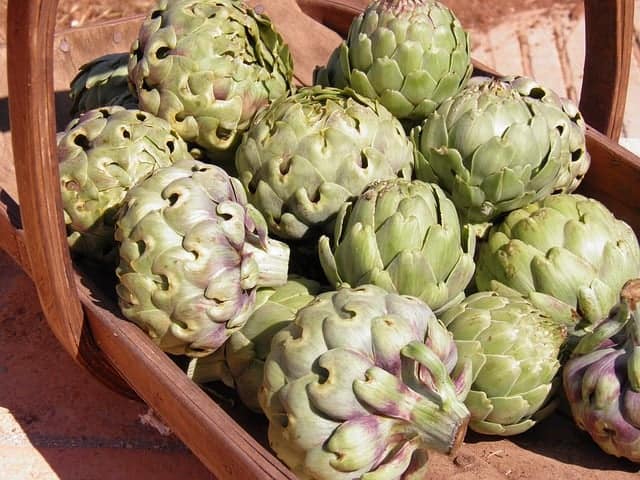Can you get sick from eating a bad artichoke?
Artichokes are a type of thistle that grows from a perennial rootstock. The edible part is the heart, which has a delicious flavor similar to mild broccoli. There are two main types of artichokes: immature flower bud (or baby) artichoke and mature artichoke.
There are several ways to prepare artichokes, including steaming, boiling, grilling, sautéing, roasting, and baking. They can be eaten raw or cooked, and they’re often served with other foods such as pasta, rice, potatoes, and salads.
Artichokes contain a compound called cynarin, which has been linked to liver damage. Is it safe to eat them?
Artichokes are members of the sunflower family and are native to Europe and Asia. They have a mild flavor and are often eaten raw or steamed. People who love these veggies also enjoy dipping them into various spreads such as hummus, pesto, and tapenade.
Artichokes are rich in fiber, vitamin C, folate, iron, potassium, calcium, magnesium, and manganese. The leaves of the plant are edible, but the inner part contains a compound called cynarin. This compound can cause liver damage.
Can you get sick from eating a bad artichoke?
If you eat an unripe artichoke, you may experience stomach upset. If you consume a large number of artichokes at once, you could become nauseous. However, if you don’t eat too many artichokes at one time, there’s no risk of getting sick.

If you’re concerned about your health, talk to your doctor before consuming artichokes. Your doctor will likely recommend that you avoid this vegetable for now.
How do I cook artichoke?
Cooked artichokes are easy to make. Simply boil them until tender. You can use either fresh or frozen artichokes. To prevent discoloration, add some lemon juice to the water when cooking.
How long does it take to cook artichokes?
Artichokes take about 15 minutes to cook. To cook artichokes you need to cut off the stem end of the artichoke, trim around the leaves, and remove any tough outer leaves. Cut off the top third of the artichoke (the hairy choke).
Slice the artichoke lengthwise into quarters. Remove the fuzzy inner leaves. Rub the artichoke quarters with lemon juice to prevent discoloration. Place the artichokes in a bowl and fill with cold salted water until the artichokes are covered.
Let stand 30 minutes. Drain and dry thoroughly. Heat 1-inch vegetable oil in a large skillet over medium-high heat. Add the artichokes, cut side down, and cook for 5 minutes. Turn the artichokes over and continue to cook 3 minutes longer. Transfer the artichokes to paper towels to drain. Serve immediately.
Can you freeze artichokes?
Yes, you can freeze artichokes. Just remove the tough outer leaves first. Then place the artichokes in resealable freezer bags. Label and date the bag. Freeze up to 6 months. Thaw at room temperature overnight.
What should I serve with artichokes?
Artichoke hearts are great served with pasta dishes, such as lasagna, spaghetti carbonara, and ravioli. Artichokes are also deliciously grilled, baked, sauteed, and even pickled.
When is the best time to eat artichokes?
The best time to eat artichokes is when they are still young and tender. When they are older, they tend to be fibrous.
Where can I buy artichokes?
Look for artichokes at farmers’ markets during springtime. You’ll find them available year-round at grocery stores.
How many artichokes should I eat?
One small artichoke has only 4 calories and provides 2 grams of protein. It also offers vitamins A, B6, K, folic acid, niacin, riboflavin, thiamine, and zinc.
How long do artichokes last in the fridge?
You can keep artichokes in the refrigerator for up to five days. Store them in a plastic container in the crisper drawer. Keep them away from other vegetables because the flavorings used on artichokes may transfer to other foods.
How much do artichokes cost?
A single artichoke costs between $1.50 and $2.00. The price varies depending on where you live.
How do you prepare artichokes?
To clean artichokes, remove the stems and rub the outside with lemon juice. Trim off the tips of the leaves. Use a sharp knife to peel back the tough outer leaves. Wash well under running water.
To prepare artichokes for cooking, cut off the tops and bottoms. Slice each artichoke lengthwise in half. Remove the fuzzy inside leaves. Rinse well under cool running water. Pat dry.
How do you store cooked artichokes?
Cooked artichokes can be stored in the refrigerator for up to three days. If you plan to use them within two days, wrap them tightly in foil or plastic wrap and refrigerate them.
Can you substitute one type of artichoke for another?
No. Each variety of artichokes has its own distinct characteristics. For example, cardoon is similar to globe artichoke but it tastes different.
Artichokes are known for being delicious, but they are also very difficult to eat. It takes a long time to eat an artichoke because of how many leaves it contains. Artichokes are divided into two main groups, globe artichokes, and Jerusalem artichokes. Both types of artichokes are edible. However, the Jerusalem artichokes are not as popular as the globe artichokes.
Can you freeze cooked artichokes?
Yes, you can freeze cooked artichokes. Just follow these steps:
Remove the tough outer leaves. Cut off the top and bottom. Slice each artichoke lengthwise in half and remove the fuzzy inside leaves. Wrap the artichokes tightly in aluminum foil. Place them in a resealable freezer bag. Label and date the package. Freeze up to six months. Thaw at room temperature overnight.
Can you reheat frozen artichokes?
If your frozen artichokes have been defrosted, you will need to cook them again before serving.
Does artichoke contain any allergens?
Artichokes do not contain any known food allergens. However, you’re frozen artichokes can be heated directly in a microwave oven by placing them in a microwave-safe dish.

Microwave on high power for about 3 minutes, turning once halfway through. Or heat them in a saucepan over medium heat until warmed through.
How do you know if artichokes have gone bad?
The best way to tell if artichokes have spoiled is to smell them. If there’s no odor, then they probably haven’t gone bad yet.
Can you make artichokes last longer?
You can prolong the life of artichokes by keeping them covered with freshwater while they’re still fresh. This helps prevent mold growth.
